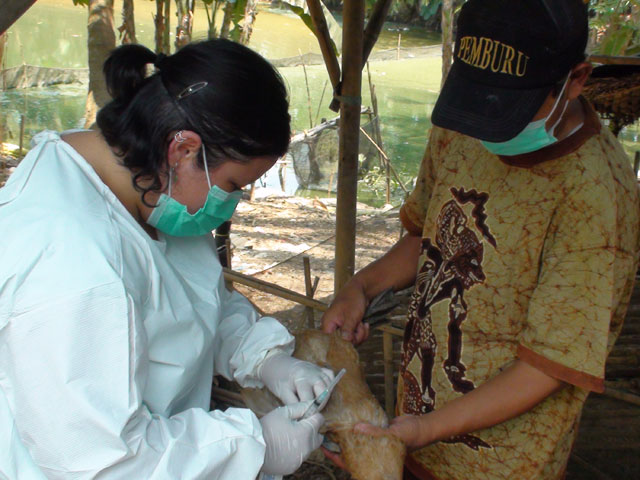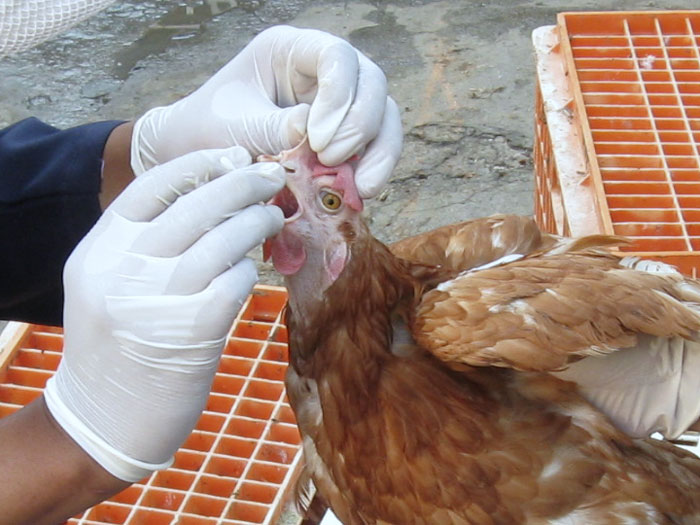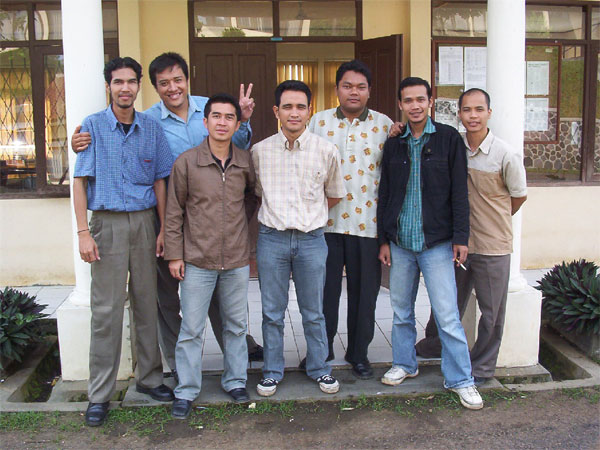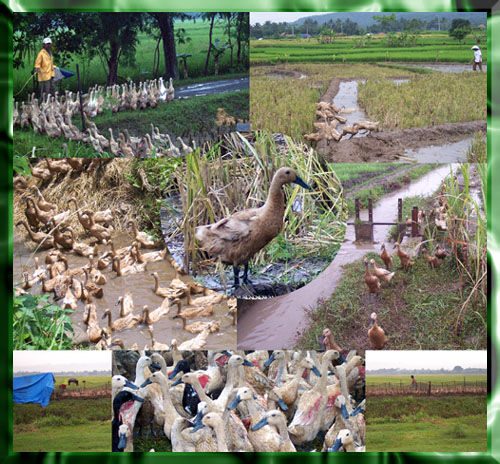Posted Wednesday, 10/21/2009 by admin

One study currently ongoing in CIVAS is a study on the Detection of Avian Influenza in Poultry Collecting Facilities (PCFs) in DKI Jakarta. The study is now entering its 5th month. It was designed based on previous studies in 2007 and 2008 where samples from 192 dead sentinel found 95.31% of the samples positive for H5 with rt-PCR tests. Also in the previous study, 32 of 38 (84.2%) PCFs studied were AI infected or in other words H5 AI viruses were found present in 84.2% PCFs studied.
Posted Thursday, 10/08/2009 by admin
 Starting from October 2009, CIVAS will conduct a study on free-range duck farms in Tangerang, Subang, and Indramayu district for 6 months. This study was conducted based on the results of a study by CIVAS and FAO in 2006 on free-range duck farming systems in Indonesia and in response to the results of a study conducted by CIVAS in collaboration with the Faculty of Veterinary Medicine of Bogor Agricultural University (FKH-IPB) and Colorado State University (CSU) in 2008 on the detection of Avian Influenza virus in free-range duck farms in Indonesia.
Starting from October 2009, CIVAS will conduct a study on free-range duck farms in Tangerang, Subang, and Indramayu district for 6 months. This study was conducted based on the results of a study by CIVAS and FAO in 2006 on free-range duck farming systems in Indonesia and in response to the results of a study conducted by CIVAS in collaboration with the Faculty of Veterinary Medicine of Bogor Agricultural University (FKH-IPB) and Colorado State University (CSU) in 2008 on the detection of Avian Influenza virus in free-range duck farms in Indonesia.
Posted Monday, 12/01/2008 by admin
This study is a continuation of a study done by CIVAS in 2007 in DKI Jakarta province. The previous study in 2007 found that 82.4% of Poultry Collecting Facilities (PCFs) in DKI Jakarta province was infected by AI, but it was unable to identify the source of the viruses. This study is a collaboration between CIVAS, Wageningen International - Netherlands, and the Marine and Agriculture Service Office of DKI Jakarta and was conducted in 12 PCFs from July to November 2008.
Posted Sunday, 06/10/2007 by admin
Poultry collecting facilities (PCFs) as a place where poultry from various areas are gathered together before slaughtered or sold to the market is considered to be a place with high risk of transmitting AI viruses. At this place, contact not only occurs among the birds gathered, but also between poultry and human. The AI endemic status of most regions in Indonesia has caused the risk of AI transmission in PCFs, which is from poultry coming from many regions, even greater.
Posted Friday, 06/23/2006 by admin
 For the implementation of “field trial vaccination” which is a collaboration between Center for Indonesian Veterinary Analytical Studies (CIVAS), Wageningen International and the District Livestock Services Office of Sukabumi, on June 23rd 2006 a market sampling was conducted in the form of blood sample and cloacal swab collection from the market, poultry collectors/brokers and slaughterhouses to obtain preliminary information about the immunity status (AI antibody titer) and AI virus presence in poultry especially chickens in Cicurug, Cikembar and Kebun Pedes sub-district (Sukabumi district) which was chosen as the program implementation area.
For the implementation of “field trial vaccination” which is a collaboration between Center for Indonesian Veterinary Analytical Studies (CIVAS), Wageningen International and the District Livestock Services Office of Sukabumi, on June 23rd 2006 a market sampling was conducted in the form of blood sample and cloacal swab collection from the market, poultry collectors/brokers and slaughterhouses to obtain preliminary information about the immunity status (AI antibody titer) and AI virus presence in poultry especially chickens in Cicurug, Cikembar and Kebun Pedes sub-district (Sukabumi district) which was chosen as the program implementation area.
Posted Sunday, 04/30/2006 by admin

The second CIVAS project is the inventory study in Sukabumi district as the first stage of module III of the Indonesian Dutch cooperation project on Avian Influenza control. A contract has been signed by International Agricultural Center (IAC) Wageningen and CIVAS on February 13th, 2006. Duration of the study is February 1st, 2006 to April 30th, 2006.
The objectives of the inventory study is to collect data and information of all relevant aspects (mapping the area, infrastructure, farm types, poultry marketing routes etc) in four selected sub districts in Sukabumi area. The four selected locations of the study are: (1) Cicurug subdistrict; (2) Cikembar subdistrict; (3) Kebon Pedes subdistrict; and (4) Jampang Tengah subdistrict.
Posted Wednesday, 03/15/2006 by admin
 The first CIVAS project is a field study on major small/medium scale free range duck systems in Indonesia. The project is based on a Letter of Agreement between FAO and CIVAS signed by FAO on 13 December 2005 and by CIVAS on 15 December 2005. The study is commenced on 15 January 2006 and a final report will be submitted by 15 March 2006.
The first CIVAS project is a field study on major small/medium scale free range duck systems in Indonesia. The project is based on a Letter of Agreement between FAO and CIVAS signed by FAO on 13 December 2005 and by CIVAS on 15 December 2005. The study is commenced on 15 January 2006 and a final report will be submitted by 15 March 2006.
The rationale of the study is that ducks are well known as one of the water birds who act as a natural reservoir for Influenza A viruses. In aquatic birds, the virus replicates predominantly in the intestinal tract is shed through the faeces. The virus is thus usually orally transmitted through water. Thus extensive systems of husbandry have a high possibility to play an important role in spreading virus because of the movement of ducks from one area to other.